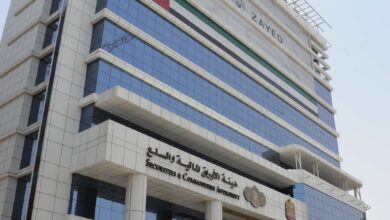UAE participates in first G20 Finance Ministers and Central Bank Governors meeting in 2023
Mohamed Hadi Al Hussaini, Minister of State for Financial Affairs, headed the UAE delegation participating in the first G20 Finance Ministers and Central Bank Governors (FMCBG) meeting in 2023.
Held for the first time under the Indian presidency in Bengaluru, the meeting discussed the progress under the G20 priorities set by the Indian presidency for the year 2023 in light of the current global challenges, and means of bolstering international cooperation to advance the G20 priorities and goals.
The UAE delegation included Younis Haji Al Khoori, Under-Secretary of Ministry of Finance; Ebrahim Al Zaabi, Assistant Governor for Monetary Policy and Financial Stability at the Central Bank of the UAE; Hamad Al Zaabi, Director of the Office of Minister of State for Financial Affairs; Thuraiya Al Hashmi, Director of International Tax Department at the Ministry of Finance; and Fares Al Kaabi, Senior Analyst, Research and Statistics Department. The meeting was held in the presence of Ministers of Finance, Central Bank Governors, Finance and Central Bank Deputies from G20 members, invited countries and members of international organisations, including the Organisation for Economic Co-operation and Development (OECD).
During his intervention, Al Hussaini thanked the Indian presidency for the warm welcome and the hospitality. He reiterated the importance of a globally coordinated multilateral action to promote climate finance, as well as strengthening joint international action to set goals and draw strategies that would best facilitate financing and investments needed to combat climate change and mitigate its repercussions.
With regard to infrastructure priorities, Al Hussaini noted that the UAE has focused on building cities that bridged digital gaps by leveraging 5G and AI to provide safety and enhance social cohesion; and enable the UAE to reduce emissions in line with its global climate change commitments. “We have leveraged private sector participation in the development of smart cities through collaborative models that incentivise private sector involvement in areas such as clean energy, green buildings and ICT infrastructure development, which we believe to be all critical enablers for the future cities of tomorrow,” he said.
Talking about global economic challenges, Al Hussaini explained that “the UAE’s economy continues to withstand global effects, where we expect to achieve 4.2 percent of non-oil economic growth by the end of this year. On a global scale, there remains an immediate need for policy coordination to minimise vulnerabilities and promote food and energy security.”
On the international tax agenda, he lauded the progress made on OECD/G20 Inclusive Framework on Base Erosion and Profit Shifting (BEPS), welcomed the work produced under the Two-Pillar Solution. He also noted the significance of considering the different levels of tax systems maturities across countries.
In regard to the Joint Finance and Health Taskforce multi-year plan, Al Hussaini welcomed the proposed priorities including the direction to develop the Economic Vulnerabilities and Risks Framework, which will be key to informing resource mobilisation in line with the objectives of the Pandemic Fund.
During the FMCBG meeting, the members discussed several areas of importance such as global economic challenges, global financial stability, infrastructure priorities for future-ready cities, sustainable finance, digital financial inclusion, global health priorities and international taxation. Members also exchanged views on ensuring seamless flow of cross-border payments, strengthening the financial sector’s cyber resilience, food and energy security, risks associated with climate change for emerging markets and developing economies, and preparedness to combat health challenges.
Moreover, members reviewed the potential implications of Central Bank Digital Currencies (CBDCs) and discussed ways to further the tax transparency agenda. They also discussed global economic recovery and means of strengthening the role and financing capacities of Multilateral Development Banks.
The ministers endorsed the work plans for the working groups of the finance track and agreed to review the progress during the next FMCBG meeting on 12th and 13th April, which will take place in Washington DC on the sidelines of the 2023 Spring Meetings of the World Bank Group and the International Monetary Fund (IMF).
On the sidelines of the FMCBG meeting, Al Hussaini participated in the Symposium on Digital Public Infrastructure, during which Nirmala Sitharaman, India’s Minister of Finance and Corporate Affairs, and Kristalina Georgieva, IMF Managing Director, delivered speeches.
On the sidelines of the meeting, Younis Haji Al Khoori attended the side events on Policy Perspectives on Crypto Assets with other Finance Ministers, Central Bank Governors and Deputies from other G20 countries. Ebrahim Al Zaabi, Thuraiya Al Hashmi, and Fares Al Kaabi, Senior Analyst, Research and Statistics Department also participated in the meeting.
Furthermore, Al Khoori held a bilateral meeting with the President of the World Bank Group, David Malpass, to discuss the latest developments on global food and energy security, as well as the UAE’s preparation for COP28 in relation to climate finance.
He also held a bilateral meeting with the Managing Director of the IMF, Kristalina Georgieva, to discuss the latest global economic developments, the G20 priorities for 2023, and to explore regional cooperation with the IMF programmes in the MENA region.
During Al Khoori’s meeting with Dr. Renganaden Padayachy, Mauritian Minister of Finance, Economic Planning and Development, the two ministers reviewed the UAE-Mauritius bilateral relationship and explored opportunities to build on the existing economic relations between both countries.
Al Khoori held a bilateral meeting with Grace Perez-Navarro, Director of the OECD Centre for Tax Policy and Administration, to showcase the UAE’s tax reforms, and discuss the broader international taxation agenda, and another bilateral meeting with Marie Lam-Frendo, CEO of the Global Infrastructure Hub, to review the GIH’s objectives for infrastructure sustainability and to discuss the G20 infrastructure-related priorities for 2023.
A bilateral meeting between Al Khoori and Antonio Freitas, Vice Minister of Finance of Brazil, discussed areas of cooperation under the Brazilian Presidency of the G20 in 2024, and to showcase the UAE’s progress on COP28 preparation.
In his meeting with Emmanuel Moulin, Director-General of the French Treasury, Al Khoori discussed the latest global economic developments and explored means of bolstering bilateral collaboration in the context of the UAE-France-India trilateral initiative that was recently announced.
WAM – Amjad Saleh




